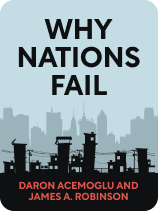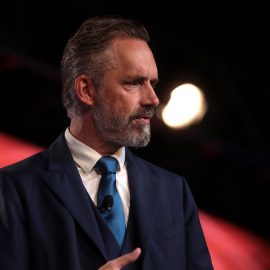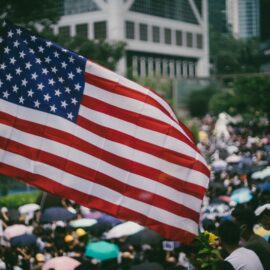

This article is an excerpt from the Shortform book guide to "Why Nations Fail" by Daron Acemoglu and James A. Robinson. Shortform has the world's best summaries and analyses of books you should be reading.
Like this article? Sign up for a free trial here.
What are extractive political institutions? How do they come into power? What makes a nation extractive?
According to the book Why Nations Fail, political institutions determine how a nation creates the rules that citizens live under. Whether a country adopts extractive or inclusive institutions also determines who wields power in society and how they wield it.
Read on to learn how and why extractive political institutions are created, according to Why Nations Fail.
Extractive Political Institutions
According to economist Daron Acemoglu and political scientist James A. Robinson, leaders don’t create extractive political institutions for purely economic reasons—they create them to maintain their hold on power. These leaders aren’t trying to decide what’s economically best, but instead are trying to protect their own political position. This explains why leaders might make decisions completely contrary to economic wisdom or that have disastrous economic results. For example, a leader might sabotage a major corporation with tariffs not because they think that’ll help the economy, but because the CEO of that corporation is a potential political rival.
(Shortform note: Creating or enforcing extractive institutions isn’t always a question of a greedy government official vying for money or power—sometimes, it’s a matter of staying alive. Take, for example, the relationship between low-level Mexican bureaucrats and drug cartels. Police officers, small-town mayors, and business owners often work with (or at least ignore) the cartels—which terrorize and exploit the population—due to the cartels’ threats of violence against these very same public officials. While this may or may not justify these officials’ corruption, it does show that “maintaining a hold on power” is sometimes more about avoiding political violence than it is about self-enrichment.)
Characteristics of Extractive Political Institutions
Acemoglu and Robinson explain that for a political institution to be extractive, it must meet one of the following two standards:
1) Non-pluralistic: Unlike pluralistic institutions described above, non-pluralistic institutions don’t allow the population at large to exercise political power and don’t create limits on government power. Therefore, non-pluralistic institutions are extractive by definition: They empower a few elites (the government and wealthy individuals) at the expense of the population at large, who can’t exercise political power or hold their government accountable.
2) Lack of enforcement: Even if a nation has pluralistic institutions, it can still be extractive if it doesn’t have the power to enforce basic rules of conduct on the elite. Without this power, there’s nothing to limit government power or hold politicians accountable. In this situation, those in power can simply ignore the rules at the expense of the people—meaning that, in practical terms, the nation has extractive political institutions.
According to Acemoglu and Robinson, nations tend to remain extractive because their leaders have a vested interest in keeping them that way. Leaders of extractive nations don’t want to threaten their rule by distributing wealth or political power. In addition, extractive institutions also give their leaders immense wealth and power that they can use to stop any attempt at change. Unlike in open nations, leaders of extractive nations don’t have to make any kind of bargain with their people—the people have no wealth or power they can use to demand change.
Why Nations Become Extractive
The Why Nations Fail authors explain that nations tend to become extractive due to one of the two following factors:
1) External influence: Historically, nations have often become extractive due to outside influence. This can be direct—like through war and conquest—or indirect, with outside nations influencing the economic and political circumstances of a nation. These outside nations are incentivized to install extractive political institutions, since they directly benefit those in power (as we discussed earlier).
The most significant example of external influence is colonialism. For hundreds of years, European nations installed extractive institutions in nations across Africa, Asia, and the Americas. Sometimes they did this through direct conquest or genocide, sometimes through supporting loyal and extractive indigenous governments, and sometimes through economic incentives (for instance, supporting slavery-dependent empires by creating a massive market for enslaved people with the Atlantic slave trade). In all of these cases, Europeans installed themselves in power at the expense of indigenous peoples.
(Shortform note: Acemoglu and Robinson discuss colonies as nations separate from their colonizers, even when they existed under their colonizers’ direct rule. This leads to an inconsistent interpretation of historical institutions: For example, the authors praise the open institutions of Great Britain in the 19th century while critiquing the extractive institutions of the British Raj during the same period. But the Raj was directly under British rule, part of the British Empire along with Great Britain. Defining the British Raj as a separate nation creates an inconsistency in which the political institutions of the British Empire are both open (in Great Britain) and extractive (in India).)
2) Internal conflict: While nations can become open when multiple factions make compromises, they can become extractive if these factions do not. This can happen in two different ways: First, if factions aren’t evenly matched, then the stronger faction doesn’t need to compromise—they can use their strength to defeat their rivals and take control. Extractive political institutions often result from this effort, since (as we discussed previously) leaders create them to cement their hold on power. Second, if the factions are evenly matched but refuse to compromise, then they will fall into conflict and each create extractive institutions to try and cement their hold on power—in such a case, a nation will often split up and cease to exist entirely.
(Shortform note: Acemoglu and Robinson cite Somalia as an example of internal conflict leading to exclusivity and eventual failure. For much of the 20th and 21st centuries, the nation frequently lacked any state power and existed in a state of conflict. However, some argue that this didn’t entirely lead to extractive conflicting factions. This argument points to the Republic of Somaliland, a nation that declared independence from Somalia in 2001. Though Somaliland isn’t officially recognized by any other nation, some experts argue that it is one of the most successful democratic nations in all of Africa. The democratic stability of Somaliland suggests that internal factional conflict may not always result in uniform exclusivity.)
| The Iron Law of Oligarchy: Why Nations Must Become Exclusive Acemoglu and Robinson cite Robert Michels’s “iron law of oligarchy” in their explanation of why nations remain exclusive. Unlike the authors, however, Michels believed not only that non-democratic (and exclusive) nations would remain that way, but also that all democratic (and open) nations would eventually transform into oligarchies. Michels argues that democratic nations are unsustainable because the internal and external structures of their governments conflict: 1. Externally, everyone in a democracy is supposed to have an equal say in government affairs. This is why the population (people external to the government) votes in elections. 2. Internally, government bureaucracy is hierarchical and undemocratic. Organizing and running the daily affairs of government requires some people to have more status and power than others. This is true at every level of government, from a post office to the leaders of the nation. Michels believes that this conflict inevitably leads to oligarchy, as leaders in government become their own separate group with higher status, power, and organizational ability. These leaders then can use these benefits to change the government in a way that serves them—change that includes getting rid of democracy and maintaining exclusive political institutions. |

———End of Preview———
Like what you just read? Read the rest of the world's best book summary and analysis of Daron Acemoglu and James A. Robinson's "Why Nations Fail" at Shortform.
Here's what you'll find in our full Why Nations Fail summary:
- Why some nations have wealth while others struggle with poverty
- Why open nations thrive and exclusive nations typically fail
- How and why some nations change over time






